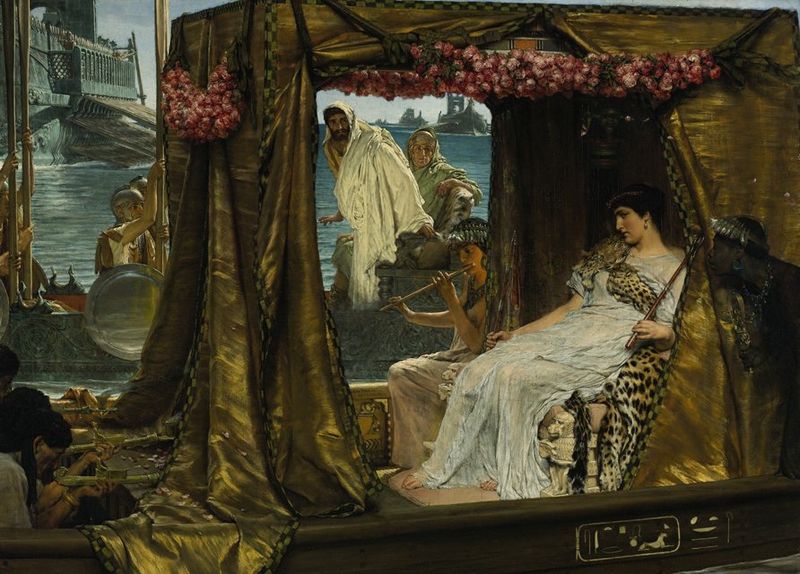 Lawrence Alma-Tadema, "Antony and Cleopatra" Lawrence Alma-Tadema, "Antony and Cleopatra" In 69 BC Cleopatra VII Thea Philopator was born. She would become the last ruler of the Macedonian dynasty and one of the most famous and powerful rulers in history. Two millennia later, Cleopatra’s presence and importance in history persists. Fact and fiction about the queen’s life, stories of her strength and her tragic ending continue to intrigue historians and inspire artists, storytellers and even playwrights like Shakespeare, who wrote the tragedy Antony and Cleopatra. Queen at Only 18 However, when her father King Ptolemy XII died in 51 BC and 18-year-old Cleopatra and her 10-year-old brother Ptolemy XIII assumed the positions as Egypt’s rulers, they were faced a number of hardships. Struggles included economic woes throughout the country, floods and famine, all of which pressured the young rulers’ political positions to maintain the control and power their family had held in Egypt for more than a century. In an already troublesome time, the two sibling’s relationship grew tense and Cleopatra left for Syria. Coming to Power In Syria, Cleopatra raised an army to defeat her brother. When she returned in 48 BC, she met Julius Caesar when his battle for power of the Roman Empire led him to follow his enemy into Egypt. Caesar and Cleopatra fell in love, and the two political powers forged armies that united to reinstate Cleopatra as queen of Egypt. In 47 BC, Cleopatra is believed to have delivered Caesar’s son, who she named Caesarion; however, more than 2,000 years later, historians still debate paternity of her child. Cleopatra went back to Rome with Caesar, but returned to Egypt after that fateful day on the Ides of March when Brutus fatally stabbed Julius Caesar in the back. Meeting Marc Antony and Falling in Epic Love When Marc Antony requested Cleopatra to state Egypt’s intentions of allegiance to Rome, Cleopatra also had an agenda. Historical reports note Cleopatra’s grand, goddess-like entrance into Tarsus. This is where the story of Marc Antony and Cleopatra’s love affair begins, according to most historical accounts, which report that Marc Antony was taken with the queen’s allure, personality and charm. The two united in love and in power. Antony needed Cleopatra’s financial funds and military strength to defeat his rival Gaius Octavius for control of the Roman Empire, and Cleopatra desired portions of Egypt’s eastern empire returned to her. In 31 BC, despite joined efforts, Cleopatra and Antony lost the sea battle at Actium to Octavius. Marc Antony and Cleopatra’s Tragic Ending Back on the battlefield, miscommunication and heartache led to the end of both of these political powers. When informed that Cleopatra died, Marc Antony fell on his sword; however, this report was ill informed and his queen was still alive. Cleopatra, too, took her own life upon hearing of her lover’s death. Allowing an Egyptian cobra to bite her flesh, Cleopatra may have died by snakebite, but her death was a consequence of broken heart. One thing is clear, the Cleopatra’s intelligence, political strategies and passion for life and love live on; the Egyptian queen’s legacy and story continue to inspire generations. And, Cleopatra’s passion remains a strong thread in the narrative weaving together her always evolving story in our history. - Lisa Zimmermann
0 Comments
Your comment will be posted after it is approved.
Leave a Reply. |
Archives
July 2017
Categories
All
|
 RSS Feed
RSS Feed